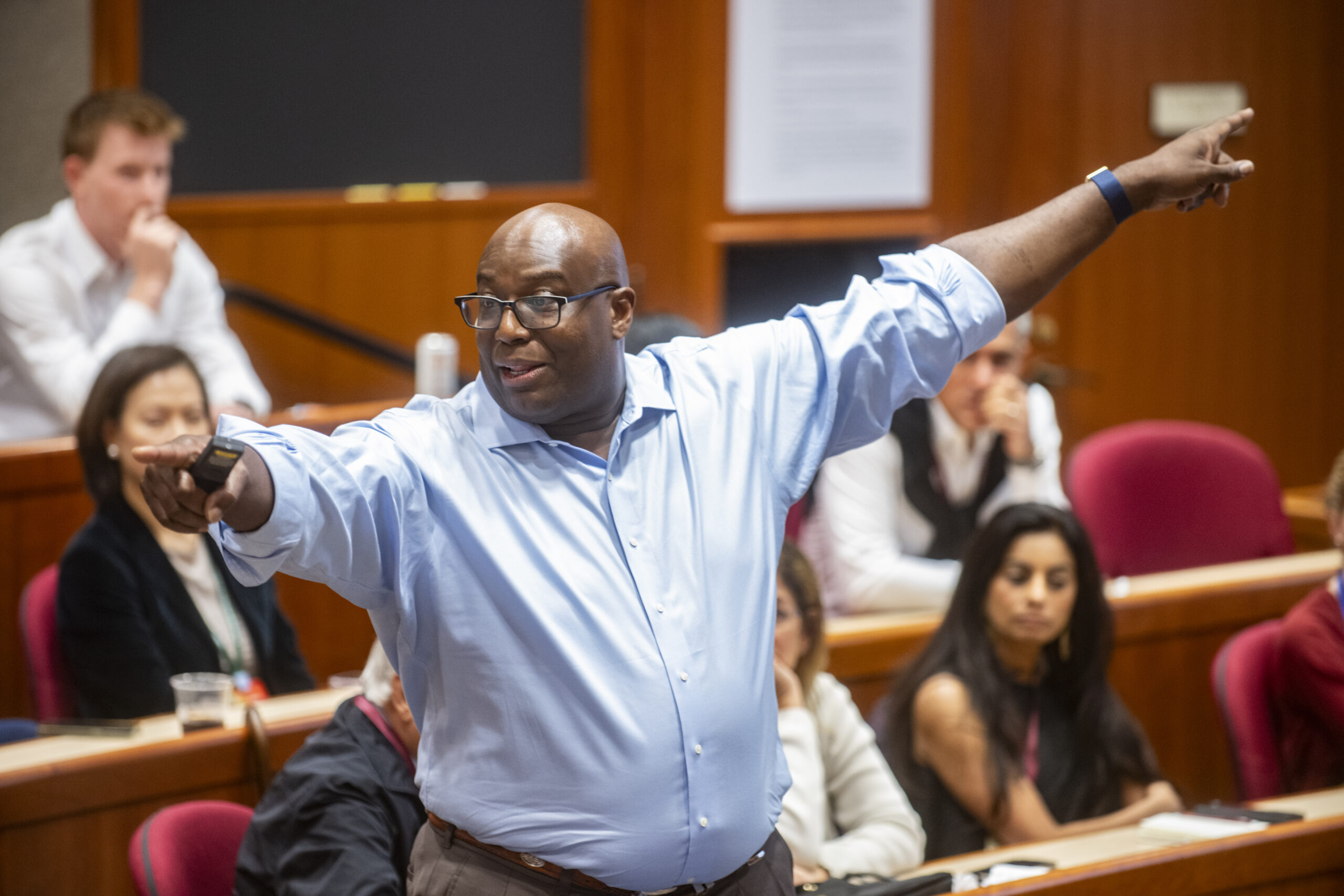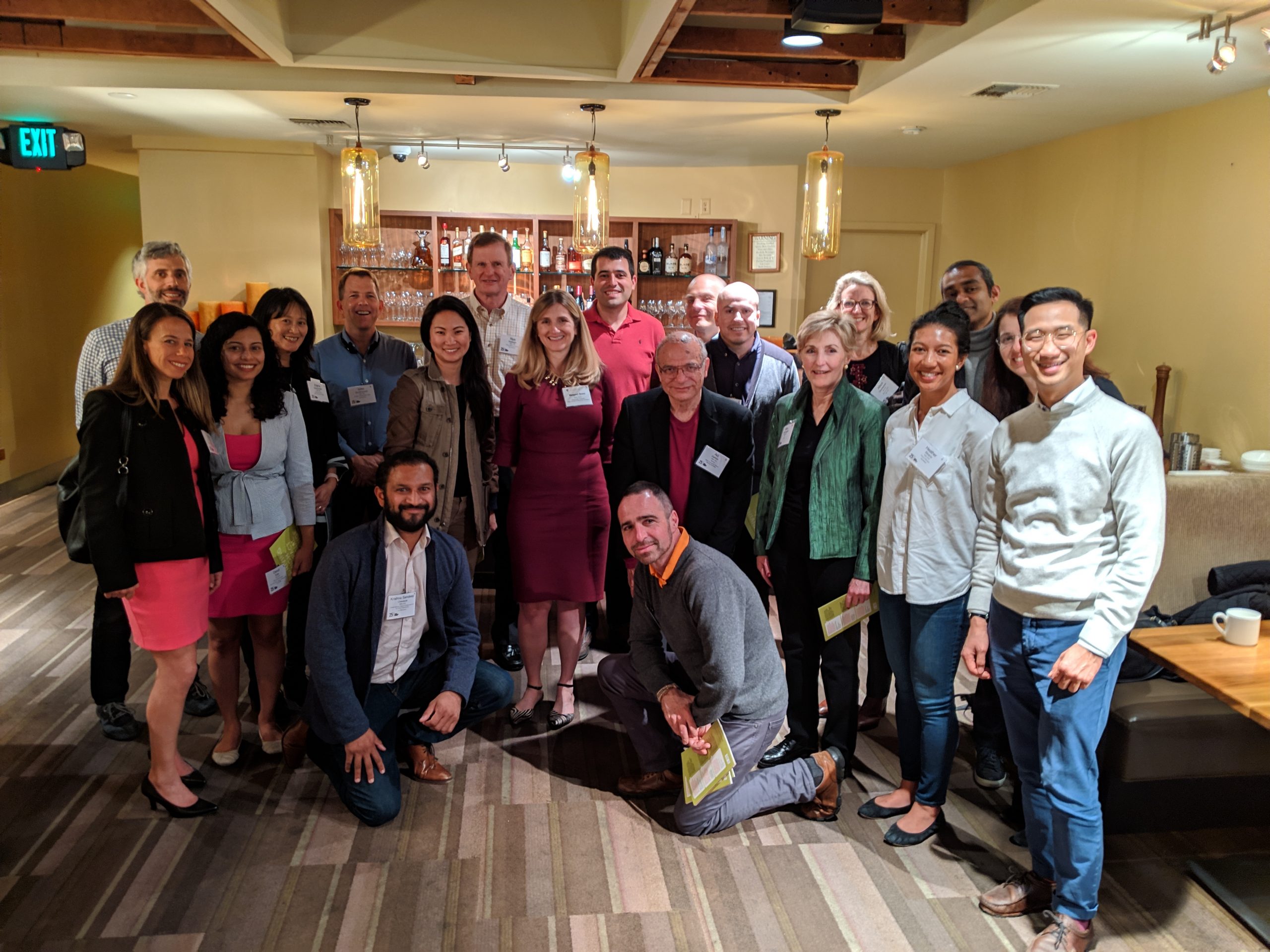

On March 14, 2019, over 20 Bay Area HBS alumni gathered for Northern California’s first HBS Business & Society Dinner, part of a series of alumni conversations around the nation to focus on broad societal issues that HBS alums are well-positioned to impact. Sponsored by the HBS Social Enterprise Initiative (SEI), the intent was to hold a “Jeffersonian dinner gathering,” where individuals of different backgrounds and perspectives convene over food to engage in a shared conversation with a purpose. The results often include building awareness around key causes, inspiring reflection and action, and creating authentic new connections.
Locally co-hosted by Kevin Barenblat (MBA 2003), Chris Eberle (PMD 2005), and myself (MBA 1998), the focus of our California Bay Area HBS Business & Society dinner was on the relationship between technology and social change. We felt this topic was apropos for Bay Area alumni to address—Silicon Valley is recognized as a nexus of rapid technological innovation that has enhanced human productivity at astonishing speed, changing the way we work, play, and interact with one another. At the same time, the rapidly evolving technology landscape has also produced a myriad of unforeseen circumstances, questioning the future of work, the rights of personal privacy, and the strength of our democracy.
I loved how our dinner brought together diverse HBS alumni, graduating from 1974 to 2018, and experienced working in a wide range of sectors including tech, social enterprise, venture capital, government, and academia. This diversity added great perspectives and created a lively discussion. The hosts first led a structured discussion on how technology contributed to social change for both good and for ill. Alumni shared numerous examples of how technology has benefited society tremendously—like providing broad access to education, healthcare, and job opportunities beyond locally-accessible resources. It has promoted socioeconomic mobility in many regions of the world, particularly in developing countries. Technology has certainly helped society operate on a more globally aware level, bringing us closer together, and advancing overall humanity.
However, all recognized as well that new problems have developed in unexpected ways. The tech boom has been catapulting some to great success, while others are losing jobs due to automation, thereby deepening economic and social divides. Technology has permitted assaults to our democracy and limited access to truth. Lack of transparency on how personal data is used and sold has brought to the forefront the question of our rights to privacy. Targeting algorithms can magnify unintended consequences such as racial profiling, news-bias, and limited choice. Just read the news and it is evident that advances in technology have prompted surprise outcomes and raised plenty of ethical questions.
In HBS-fashion, the hosts then switched gears to lead the group to focus on solutions. How can HBS alumni operationalize more social good in tech—what were the best levers to promote positive change, what has worked so far, and what can we do, as individual actors, to drive change? Most people at the dinner felt optimistic about the role technology could play in the future—especially if there were some guardrails installed. It is, after all, a tool that is wielded by humans. Perhaps technology could be directed to solve highly complex societal challenges such as climate change and homelessness that we could not have solved before. Perhaps we should champion technologists to adopt a creed, like those in medicine or journalism do, to abide by specific ethical standards. Perhaps HBS could add one small but mighty word to its mission statement, “…educate leaders who make a positive difference in the world,” to reinforce its own commitment to catalyzing societal good. And then HBS could play a more prominent role in research that would ultimately influence the passage of new policies that would incentivize tech companies to act responsibly and think routinely about the implications of its actions.
Feedback from the participants of our first Bay Area HBS Business & Society dinner indicated it was a definite success, with many guests afterwards advocating for more dinners like these. As one shared afterwards, “It was great to bring alumni together, take a step and think both big picture and long term, away from day to day deadlines and deliverables.” Others talked about how fun it was to have a planned, structured conversation, allowing more engaging alumni interactions beyond the typical “Where do you live and where do you work?” conversations at social events.
I’m thrilled to hear that HBS SEI will be sponsoring more events like this in the future. “We’re incredibly pleased at the thoughtful conversations and meaningful connections that have occurred at dinners we’ve sponsored in DC, New York, Boston and now in the Bay Area. We are looking forward to sponsoring additional dinners like these across the country to continue fostering conversations about the most prescient issues of our time,” remarked Margaret Busse, Associate Director of SEI.